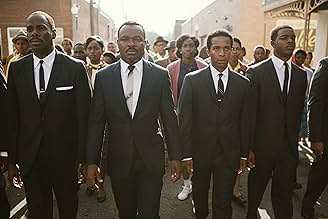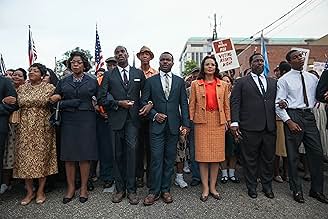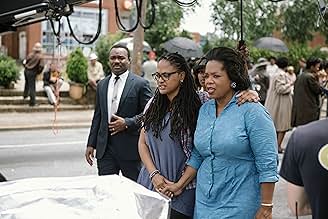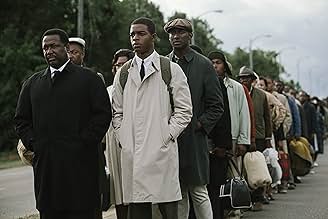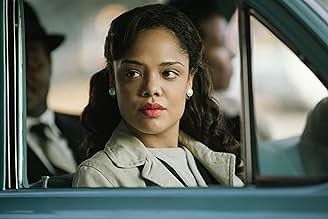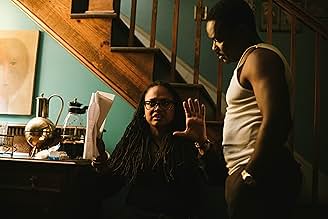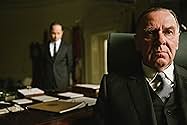Uma crônica da campanha do Dr. Martin Luther King Jr. para adquirir o direito de voto durante a marcha desde Selma até Montgomery em Alabama, em 1965.Uma crônica da campanha do Dr. Martin Luther King Jr. para adquirir o direito de voto durante a marcha desde Selma até Montgomery em Alabama, em 1965.Uma crônica da campanha do Dr. Martin Luther King Jr. para adquirir o direito de voto durante a marcha desde Selma até Montgomery em Alabama, em 1965.
- Direção
- Roteirista
- Artistas
- Ganhou 1 Oscar
- 58 vitórias e 91 indicações no total
- Girl #5
- (as Nadej Bailey)
- James Orange
- (as Omar Dorsey)
Avaliações em destaque
Admittedly it is a little bit sad that a film about civil rights can still have so much relevance in 2015, but such is the way of prejudice and bigotry in all of its ever changing forms. Selma does a fantastic job at making this fight as real and accessible as possible, highlighting this struggle on a personal level for King and his associates. These events were well before my time, but as far as I know this film paints a very realistic picture of the time, from the look of the sets, the costumes, and the emotions and tensions filling the air.
At the end of the day, though, it's the portrayal of Dr. King that drives this film home. David Oyelowo is a powerhouse that carries this film with a startlingly accurate representation of the reverend; one that is filled to the brim with passion and poise, while also breaking down the larger than life illusion that surrounds the man, and bringing him down to earth as the very real and very flawed human being he actually was. His controversial decisions are touched upon in the film, as well as his infidelities which truly bring him to the human level.
It's a damn good thing that Oyelowo can carry this film, too, as the emotional prowess of the story relies solely on him. Selma is packed with a great supporting cast with everyone from Tom Wilkinson to Tim Roth to rapper Common, but there is no denying that all these supporting players play second fiddle to Oyelowo. If Oyelowo is at a 10 as the lead of the film the rest of the cast sits at an 8 across the board with no one character getting a lot of attention as the focus consistently remains on King. I would have liked to see some more attention turned towards the supporting cast, but with a biopic on one of the most influential names in American history you almost have to expect this.
Selma highlights a grim portion of our history, one so grim that it needs to be immortalized in film so that we don't forget the troubled history we came from. This is an incredibly important film about an incredibly important man. It's not something you watch for entertainment value and not something you watch over and over again, but it is something you need to watch to gain some highly accurate perception of a crucial time in history it is imperative we never forget.
March 7, 1965 is known as Bloody Sunday and marks one of the most despicable moments in U.S. history. It was also a turning point in the Civil Rights Movement and can be viewed as shrewd strategy from Martin Luther King, Jr. and his organization, the Southern Christian Leadership Conference. The movie makes it clear that MLK had a full understanding that Selma, Alabama and it's racist, redneck Sheriff Jim Clark provided the perfect opportunity for a violent reaction to King's demonstrations and protests. It also makes it very clear that there was boundless ignorance, hatred and racism on the part of many southern whites. If the subject matter is somehow not enough to grab your attention, the startling event that occurs 5 minutes in will surely leave you shaken.
The film does an outstanding job of focusing on two pieces of this most complex puzzle: 1. the boots on the ground – the grass roots movement of the people, and 2. the ongoing political debates occurring between MLK and LBJ, between LBJ and his staff, and between MLK and his lieutenants.
The Civil Rights Act had already been passed, so the efforts were in hopes of overcoming the obstacles faced by southern blacks who wished to vote. One of the film's best scenes has activist Annie Lee Cooper (Oprah Winfrey) trying yet again to have her voter registration processed, but being rebuffed by a county clerk through an impossible Q&A session. These intimate moments are where the film excels: Coretta questioning MLK on his love for her, MLK speaking with grandfather of Jimmie Lee Jackson outside the morgue, and MLK turning down the proposal of US Attorney John Doar (Alessandro Nivola).
In an odd twist of casting, four of the leading characters are played by Brits: David Oyelowo as MLK, Tom Wilkinson as LBJ, Tim Roth as George Wallace and Carmen Ejogo as Coretta Scott King. All four are excellent, but it's Mr. Roth as the racist-beyond-belief Alabama Governor Wallace that is the most slitheringly evil, while Mr. Oyelowo gives what can only be described as a towering performance of the man many of us know only from history books and news reels (and a January holiday).
The supporting cast is vast and talented, and because the story spends so much time on the individuals, many of these spend little time on screen. In addition to Andrew Young (Andre Holland), Reverend Hosea Williams (Wendell Pierce), J Edgar Hoover (Dylan Baker), and Lee C White (Giovanni Ribisi), we also see activist Diana Nash (Tessa Thompson), CT Vivian (Corey Reynolds), John Lewis (Stephen James), and Judge Johnson (Martin Sheen). The most bizarre moment has Malcolm X (Nigel Thatch) in a quasi-Mr Rogers depiction as he discussed his new found approach with Coretta.
The original King speeches are owned by another studio so those delivered here by Oyelowo have been re-written and revised, yet the words and Oyelowo's powerful oratory deliver the message loud and clear. While it can be argued that the film delivers only one point of view (the FBI was no friend to the movement), it can just as easily be argued that previous films have done the same thing – only from the "other" perspective (Mississippi Burning, Ghosts of Mississippi).
In what can be viewed as the first serious movie on Martin Luther King, director Ava DuVernay announces her presence with authority. She will have no need to return to her career as a movie publicist, and we will be watching to see what type of projects appeal to her after this. In a brilliant move, the story focuses on a period of just a few months in 1965, rather than tackling the MLK legacy. She presents him as a man with strengths, flaws, doubts, and determination. It's clear why so many followed him, and it's all the more painful to know that so many resisted.
The year is 1964 and racial tension is rife in the Southern states, with attacks and murders of black citizens going unpunished by the combination of a white-majority policing and legal system. Enter Martin Luthor King (English actor David Oyelowo) at the point of receiving his Nobel Peace prize. King insists at a Presidential level (with Tom Wilkinson playing Lyndon Johnson) that black citizens be allowed unfettered rights to vote in elections, with the aim of securing a more just and balanced society. Looking for a suitable location to mount a media-led stand, in an age before social networking and 'Arab-Springs', King centres his attention on the Alabama town of Selma, mounting a series of non-violent (at least on their side) protests and marches. The local redneck police chief, Wilson Baker (David Dwyer), and the state governor, George Wallis (Tim Roth), are not going to stand for this and the tinder-box reaches ignition point during a march from Selma to the state capital of Montgomery.
Nominated for the Oscar for Best Picture (but only that in the major awards, so winning chances are probably near-zero), Selma is primarily an excellent example of an ensemble cast that works particularly well together. There are a wealth of outstanding performances: Tom Wilkinson's Lyndon Johnson comes across as a surprisingly sympathetic character (jerking me out of my natural Vietnam-coloured perception of the politician); Oprah Winfrey (also a co-producer) provides a text-book example of acting without acting, her expressions doing all of the work; Dylan Baker (so fantastic in "The Good Wife") is chillingly sinister as J. Edgar Hoover; English-born Carmen Ejogo plays (extremely well) a similar role to Sienna Miller's in "American Sniper" as the wife alienated by her husband's calling; and Giovanni Ribisi ("Saving Private Ryan", "Friends"), Cuba Gooding Jnr and (a bizarrely uncredited) Martin Sheen turn up in great cameo performances.
But towering over all of this great acting is Oyelowo's performance which is simply outstanding: every death and injury is etched on his face. This is a Martin Luthor King that you can really believe in. I would have personally bounced Bradley Cooper in the nomination list for him, and it is astonishing (given his English background) that he was also overlooked at the BAFTAs. He must be feeling pretty aggrieved right now. Mr Oyelowo – if you are reading this – this critic thanks you for an outstanding performance.
As a relative newcomer to direction, at least for a movie of this scale, Ava Duvernay does a great job with some of the action scenes (with particularly the shocking opening to the film showing enormous style). Paul Webb (apparently with this as a screen writing debut – – how on earth did he get THIS job?) does a creditable job, with lots of memorable sound-bites that stick in the mind. Where the film ran into soft mud for me however was in the personal scenes between the married couple: they don't really provide enough insight into the stresses of King's serial adultery, and the plotting becomes slow and dull . I personally lost interest in most of these scenes and was desperate for the film to get back to the 'action' in Selma.
Also of note is the end title song – "Glory" by John Legend and Common (who also stars in the film) – which is also nominated for an Oscar and won the Golden Globe.
Both gay rights and racial equality undoubtedly still have much further to go, but this does make you proud that as US and UK societies we have come so far within my own lifetime. A recommended watch, particularly for those with an interest in sociology and/or American history.
(If you enjoyed this review, please see the multi-media version together with more reviews at bob-the-movie-man.com and enter your email address to subscribe. Thanks.)
I loved it. It should have gotten more Academy Award nominations than it did. Especially for the actors who played Martin and Coretta King. I can't believe they are not even Amerian actors. Nicely done accents. The actor who played LBJ was also very good, but being from Texas I was not as convinced by his accent. If I was on the Board for the Academy Awards I definitely would nominate this movie for Best Picture, Best Director, Best Actor, Best Supporting Actress - at minimum.
David Oyelowo's portrayal of Martin Luther King Jr. was so spot-on that I was immediately drawn in to see every detail of the film play out. I was disturbed and further curious at the same time amongst every scene that unfolded during the key moments of the film.
Basically, it featured how much King sacrificed and went through in the 1960s to maintain blacks rights to vote and eliminate segregation from all states. I couldn't believe how much violent injustice and racial discrimination were used to intimidate innocent people who were trying to have the same rights like many in America.
Oprah Winfrey, Cuba Gooding Jr, and rapper-actor Common brought out great performances as the individuals who stood up for what they truly believe in and they wouldn't let hate stand in their way. Tom Wilkinson's portrayal of President Lyndon B. Johnson was rather physically uncanny and his scenes brought out the angst of what he had to face at a time when violence was further escalating during the Civil Rights Movement. Tim Roth as Governor George Wallace made me feel to hate the man for his segregationist beliefs, but when confronted by President Johnson himself, it just got real.
The juxtaposition of real-life archive footage in the movie gave a nice touch to how very genuine these people of Selma endured plenty of horrible confrontations. Whether these usually ended in violence or even death, they just kept growing in numbers and overcome all who stood against their true beliefs in racial equality.
My only nitpick was that of President Johnson's confrontations with Martin Luther King himself. I've learned in the history books that they've had their fair share of disagreements, but nothing this intense as shown on screen. Nevertheless, it proved that being an American President was no easy feat at a very difficult time. Overall, this is a film that didn't require lengthy (moving) MLK speeches, instead it focused on tense confrontations black people had to endure and how one individual stood tall and fought back not with violence, but with powerful words and strong beliefs. I applaud David Oyelowo and director Ava DuVernay for providing a glimpse into how racism was overcome by one profound man whose legacy still reverberates to this day.
Você sabia?
- CuriosidadesThe explosion in the opening scene is the infamous 16th Street Baptist Church bombing, which occurred in Birmingham, Alabama on September 15, 1963. The 4 young girls killed in the bombing were Addie Mae Collins, Denise McNair, Carole Robertson, and Cynthia Wesley.
- Erros de gravaçãoWhen MLK meets with LBJ in the Oval Office, Johnson is seated at the Resolute Desk. When Lyndon B. Johnson took office in 1963, he found he was too large for the desk, and commissioned a plainer replacement which was built by the Senate cabinet shop.
- Citações
Martin Luther King Jr.: [somberly yet passionately speaking to church congregation at a funeral] Who murdered Jimmie Lee Jackson? Every white lawman who abuses the law to terrorize. Every white politician who feeds on prejudice and hatred. Every white preacher who preaches the Bible and stays silent before his white congregation. Who murdered Jimmie Lee Jackson? Every Negro man and woman who stands by without joining this fight as their brothers and sisters are brutalized, humiliated, and ripped from this Earth.
- Cenas durante ou pós-créditosMartin Sheen is not listed in the credits.
- Trilhas sonorasOne Morning Soon
Written by Traditional
Performed by Joyce Collins & Johnita Collins
Courtesy of Tompkins Square, LLC
Principais escolhas
- How long is Selma?Fornecido pela Alexa
Detalhes
- Data de lançamento
- Países de origem
- Centrais de atendimento oficiais
- Idiomas
- Também conhecido como
- Selma
- Locações de filme
- Selma, Alabama, EUA(foot of Edmund Pettus Bridge - scene of Bloody Sunday)
- Empresas de produção
- Consulte mais créditos da empresa na IMDbPro
Bilheteria
- Orçamento
- US$ 20.000.000 (estimativa)
- Faturamento bruto nos EUA e Canadá
- US$ 52.076.908
- Fim de semana de estreia nos EUA e Canadá
- US$ 571.450
- 28 de dez. de 2014
- Faturamento bruto mundial
- US$ 67.782.762
- Tempo de duração
- 2 h 8 min(128 min)
- Cor
- Mixagem de som
- Proporção
- 2.35 : 1







